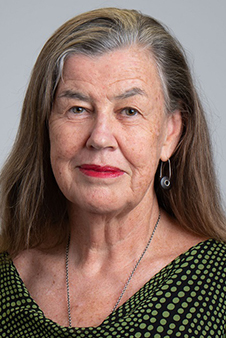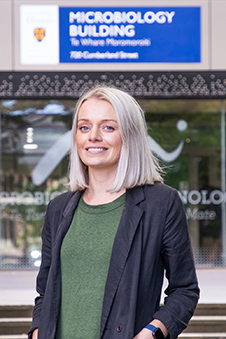The breadth and strengths of University of Otago research is evident in this year’s Otago Research Awards.
Impacts on health, housing, wildlife and legislation in Aotearoa and the Pacific are among the areas of investigation for the 13 researchers honoured with this year’s awards.
Deputy Vice-Chancellor (Research), Professor Richard Blaikie says he is always impressed by the quality and range of research being undertaken at Otago when he reads the nomination forms each year and 2023 is no exception.
“These awards allow us to reward with funding and public acknowledgement the meaningful research being conducted here, both by those with a lengthy career and those near the beginning of their research journey.”

Distinguished Professor Philippa Howden-Chapman.
The premier award, the Distinguished Research Medal, is this year awarded to Wellington’s Poutoko Taiea Sesquicentennial Distinguished Professor Philippa Howden-Chapman CNZM QSO FRSNZ, the Co-director for He Kāinga Oranga | Housing and Health Research Programme.
Professor Howden-Chapman’s history of research and the impact she has had on New Zealand is extensive, and the University’s acknowledgment through the presentation of its highest research honour was a well-deserved recognition of decades of work, Acting Vice-Chancellor Professor Helen Nicholson says.
“Professor Howden-Chapman’s demonstrated commitment to improving health outcomes, and her leadership of her outstanding multi-disciplinary research team, have been a critical influence on public policy in Aotearoa.”
She leads an impressive list of research award winners this year, Professor Nicholson notes.
Asked about her win, Professor Howden-Chapman says she is “delighted that my team’s research carried out with communities on housing and health has been recognised for the policy-focused evidence that we have built up over two decades”.
“I am honoured to have joined a very distinguished group of Otago researchers who have received this award, and whom I have long admired.”

Professor Jemma Geoghegan
The Rowheath Trust Award and Carl Smith Medal is this year awarded to Professor Jemma Geoghegan, the Webster Family Chair in Viral Pathogenesis, Department of Microbiology and Immunology.
Professor Geoghegan adds the Award and Medal to an impressive list of achievements, including her recent appointment to the Chair, and promotion to Professor.
Her research focuses on several areas across the field of virology, including determining the fundamental patterns and processes of viral evolution, ecology and emergence.
In 2020, she was instrumental in establishing the genome sequencing of SARS-CoV-2 in Aotearoa, using an approach later described as “world-leading”.
The history of the prestigious research award at Otago was a highlight for Professor Geoghegan when she learned she had won.
“I was thrilled to hear the news that I’ve received this award mainly because I associate this prize with a long list of extremely talented previous awardees whose work I really respect and who I find inspiring.”
New awards
Two new award categories were announced this year – early career researcher awards for Māori and Pacific kaimahi.
These awards were introduced to celebrate distinction in research undertaken by our Māori and Pacific researchers as they develop their careers with us, which in many cases involves significant, active and positive engagement with communities.
The term Tofā Sāili, gifted for our Pacific Early Career Awards, refers to the wisdom gained through the constant search for truth.
The inaugural winners are:
- Dr Troy Ruhe (Va’a o Tautai | Centre for Pacific Health) – Tofā Sāili Pacific Early Career Awards for Distinction in Research
Dr Ruhe was described in his nomination as being “deliberate in his trajectory” to create equitable health research outcomes in Pacific populations, through understanding the nuances, and most acceptable and appropriate methods of implementing health research into those communities. Part of his current work is bringing a unique Pacific approach to the use of ‘big data’, concerning equitable health outcomes and Pacific Data Sovereignty. - Dr Alana Alexander (Department of Anatomy) – Māori Early Career Awards for Distinction in Research
Dr Alexander is passionate about weaving together Te Ao Māori and science, specifically as a molecular ecologist/evolutionary biologist using bioinformatic methods to focus on the interplay between pattern and process in genomic data. Her current research includes investigating the past impacts of fisheries on the endangered Hector’s and Māui dolphins and then using genomics to predict the impact of future climate change on both whales and dolphins. She is also working alongside local communities to co-develop science pūrākau – memorable narratives to translate her scientific work to empower and uplift those who hold katiakitanga and rangatiratanga over taonga species. - Dr Erica Newman (Te Tumu – School of Māori, Pacific and Indigenous Studies)
Dr Newman’s current research focuses on descendants of adopted Māori tamariki raised in non-Māori households and for descendants’ inability to establish a connection to their Māori whānau. This significant work contributes to ongoing work on identity and belonging for Māori who are disconnected from their tūrangawaewae through adoption and will inform government legalisation and practices about adoption.
Early Career Awards for Distinction in Research
Seven early career researchers are rewarded for their commitment to research excellence, growing leadership in their fields and engagement with their communities.
- Dr Matt Jenkins (Department of Psychological Medicine, Wellington), research in applying health psychology principles and co-design to support the health and wellbeing of general and specialised populations, such as people living with mental illness.
- Dr Kimberley O’Sullivan (Department of Public Health, Wellington), research in energy poverty (energy hardship), consumer experiences of energy use, energy efficiency of housing and buildings, and the interaction of all of these with the health and wellbeing of people.
- Dr Simon Jackson (Department of Microbiology and Immunology), research on understanding how bacterial immune systems protect their hosts against bacterial viruses (bacteriophages) and the use of bacteriophages as therapies against bacterial pathogens.
- Dr Hemakumar Devan (Department of Medicine, Wellington), research which aims to foster self-management support to empower people with persistent pain, and their whānau, with equity and valuing lived experience core to his work.
- Dr Matthew McNeil (Department of Microbiology and Immunology), research on investigating the mechanisms that allow bacteria to survive antibiotic treatment and developing new therapeutic approaches to combat drug-resistant infections.
- Dr Sara Miller (Department of Chemistry), research in vibrational spectroscopy coupled with multivariate analysis and its application to a wide variety of materials and complex systems including pharmaceutics, hard and soft tissues, and primary produce.
- Dr Stephen Young (Faculty of Law), research areas involving the intersection of Indigenous peoples and law, human rights, and duties and obligations, drawing from critical and social theories.
Research Group Award
Te Pokapū Mātai Taiāki Iaia, the Centre for Neuroendocrinology in the School of Biomedical Sciences, is the winner of the Research Group Award.
Internationally one of the largest and most well-recognised groupings of researchers in the neuroendocrinology field, the collaborative group publishes an average of 30 peer-reviewed papers a year, many in high impact journals. Since 2018 alone, the researchers have secured $16 million in external research support from fully-costed grants.
The Centre, comprise of 51 staff and students and led by eleven key researchers, is focused on understanding how the brain controls hormone levels in the blood and how those hormones can act back to influence brain function.
For more information please contact:
Jessica Wilson
Adviser Media Engagement
University of Otago
Mob +64 21 279 5016
Email jessica.wilson@otago.ac.nz